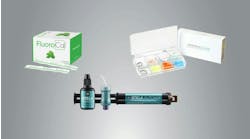by Nate Booth, DDS
Over the past eight years, I’ve talked with hundreds of dentists and analyzed dozens of dental practices. I discovered that success in dentistry is primarily due to skill sets in three diverse areas — clinical skills, business skills, and relationship skills. While any one of the three skill sets can be a dentist’s downfall, poor relationship skills typically reduce production and enjoyment level the most.
To be an effective dental leader, you will want to learn how to form effective relationships with your team and your patients. In this article, you will discover six keys to forming outstanding relationships with your team. Like a jet flying from point A to point B, your dental practice is moving from where you are now to where you want to be. You’re the captain, and your team is the crew. It’s vital that you select the right crew members. That’s why the first three teamwork keys concern attracting and selecting outstanding people.
Key No. 1 — Be a person who attracts outstanding team members
When they think about hiring team members, most dentists focus on external factors such as placing good ads in the right places and using the best hiring procedures. While these external factors are important, they pale in comparison to the internal factors of the dentist’s personal character.
People want to work with dentists who are honest, caring, and fair. They want to work with servant leaders, not serve dictatorial ones. They want to be members of a team, not part of a staff. They want to enjoy working with leaders, not just tolerate them.
If you can become the leader you ought to be on the inside, you will become the leader you want to be on the outside. — John Maxwell
Follow John Maxwell’s advice. Look inside first. If you don’t like what you see, change it for the better now. Then and only then will your outside circumstances change.
Key No. 2 — Have a practice that attracts outstanding team members
After some of my presentations to dental groups, dentists come up to me and say, “I’d really like to use your ideas for creating a better practice, but I just can’t seem to find any good staff to work for me.”
I don’t say this, but I’m thinking it: “Hey, maybe your practice stinks.” I know there are times when it’s a challenge to find good people. But if it’s almost always that way, it ain’t them. It’s you and your practice!
Keys No. 1 and No. 2 illustrate a basic truth. You attract what you deserve in life. If you’re a lousy leader with a lousy practice, you’re going to attract lousy team members and lousy patients. If you’re an average leader with an average practice, you’re going to attract average team members and average patients. If you’re an outstanding leader with an outstanding practice, you’re going to attract outstanding team members and outstanding patients.
It all begins with you and the practice that you lead. This is great news! If your success were primarily due to external factors, there wouldn’t be much you could do to improve the situation. If it’s you, you’re in control of the future.
There are two other things that bother me about the “I just can’t seem to find any good staff to work for me” phrase: ¿ The people should be your team, not your staff. Staff is an infection. Disinfect your vocabulary to kill the word. ¿ The people should work with you, not for you.
Key No. 3 — Hire for attitude and train for skill
Have you ever hired a person who was extremely skilled and had vast experience? Maybe her attitude wasn’t the greatest, but you figured that would change once she joined your team. That’s a good one, isn’t it? Whose attitude got changed? Yours probably did!
In their book, The Boomerang Effect for Dentists, Drs. Matt Bynum and Art Mowery stress the importance of hiring team members with great attitudes. This is vital because people have varying degrees of positive and negative attitudes. They interpret their worlds through these attitudes and then get out of life what they look for.
So, select people you would enjoy socializing with outside the office. During the initial interview, watch out for people who interrupt. That’s a bad sign. If your gut tells you something’s wrong with the person, go with your feeling.
People can fake a positive attitude during a 30-minute interview in your office. To get around this, have the person go to lunch with your team (minus you) away from the office. If the team decides the person has potential, schedule a one-week, paid working interview.
It’s wonderful if the person you bring into the team also has the necessary skills to do the job effectively. If they don’t have the skills, their positive attitude will propel them to learn what they need to know.
Key No. 4 — Decide what’s important and then talk about it over and over
As the leader of your team, answer this question: “What’s most important in our office?” Here are a few possible answers:
- Delivering high-quality care to our patients
- Providing outstanding service to our patients
- Enjoying our time in the office
- Being extremely profitable so we can earn an excellent living
- Learning new business, clinical, and people skills
Now that you’ve decided what’s most important, repeatedly talk about it. Talk about it at your morning huddles, weekly meetings, and yearly retreats. Collect stories of people who have exemplified the important items on your list — a hygienist who provided outstanding perio care that healed a patient’s mouth; a clinical assistant who went above and beyond to help with a patient’s care; or an administrative person who brightened everyone’s day with an unexpected and kind act.
Tell these stories to your team, your patients, and your community. Nordstrom and Southwest Airlines managers make a point of telling stories about their team members who exemplify what’s most important to them. You should too.
Key No. 5 — Prune your prima donnas
Prima donnas are all about me, me, me. Team players are all about we, we, we. A great way to instill the team concept in your office is to add the phrase “and whatever it takes to give outstanding service to all our patients” to the end of everyone’s job descriptions. Stress the “whatever it takes” concept to your team. Make it a big deal. Talk about it over and over.
If a team member doesn’t buy into the concept by exemplifying the That’s Not My Job syndrome, maybe the prima donna needs a career adjustment. If you can’t decide whether she should stay or go, here are two questions that will make your decision easier:
- “Knowing what I now know about this person, would I hire her again?” If your answer is “no,” part ways quickly.
- “If this person told me that she had found a new job elsewhere, would I be disappointed or relieved?” If your answer is “relieved,” pull out the pink slip.
If you have two prima donnas constantly bickering and their little feud is affecting patient care and getting on the team’s nerves, have a private meeting with the two. Tell them, “Maria and Doris, it’s obvious you two aren’t getting along. I like and respect both of you, but this can’t continue.
If you don’t dramatically improve the situation in one week’s time and keep it improved, we’re going to meet again. I’m going to flip a coin. If it comes up heads, Maria will need to find a new job. If it comes up tails, Doris will move on. I’ll leave you two alone now so you can talk. I hope you can work it out.”
Key No. 6 — Make office enjoyment a priority
Think about the numbers you track, compile, and analyze at the end of each month. Is it a big list of logical items such as number of new patients, gross production, net income, and accounts receivable? These numbers measure important items, but I believe one vital aspect of a dental practice that rarely is measured and prioritized is the enjoyment level of the entire team.
Here’s what I recommend you do. Once a month, at one of your regular meetings, have everyone rate his or her experience in the office for the past 30 days on a scale of -10 to +10.
- -10 represents “I absolutely hate my time in the office!”
- 0 represents “My time in the office is OK.”
- +10 represents “I absolutely love my time in the office!”
Add all the numbers and divide by the number of team members to get an average. Then have the team members answer these questions:
- What factors were in place and what did we do last month that positively affected our enjoyment level?
- How can we expand upon these factors and actions to increase our enjoyment level?
- What factors were in place and what did we do last month that negatively affected our enjoyment level?
- How can we expand upon these factors and actions to increase our enjoyment level?
Now, take action on your answers. Assign one person to be in charge of each action item and set a completion date for each action item.
When I was a dentist, I hated walking through my office door. That’s why I’m a huge promoter of raising the enjoyment level of your office, and why I wrote three chapters on the subject in Joe Blaes’ and my book called 555 Ways to Reward Your Dental Team.
Conclusion
In the world of real estate, the mantra is location, location, location. In the world of dentistry, the mantra should be relationships, relationships, relationships. Start today to make the relationships with your team the masterpieces they were meant to be. Then sit back and watch your production and enjoyment level soar!
Dr. Nate Booth is a speaker, consultant, and author who provides dentists with the information and systems needed in order to thrive in dentistry. A frequent speaker to dental groups, Booth presents his audiences with high-content programs that are packed with enthusiasm and humor. He is the author of the books Thriving on Change and The Diamond Touch. He is the co-author of the books 555 Ways to Reward Your Dental Team, How to Create an Exceptional Aesthetic Practice, and Unleashing the Power of Dentistry. He can be reached at (800) 917-0008 or visit his Web site at www.natebooth.com.







